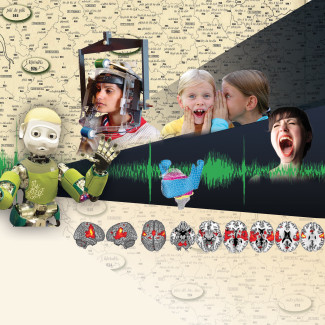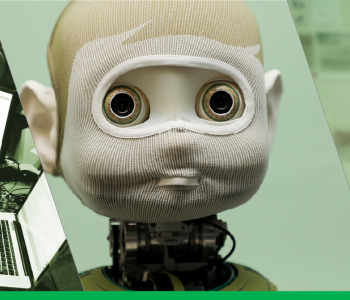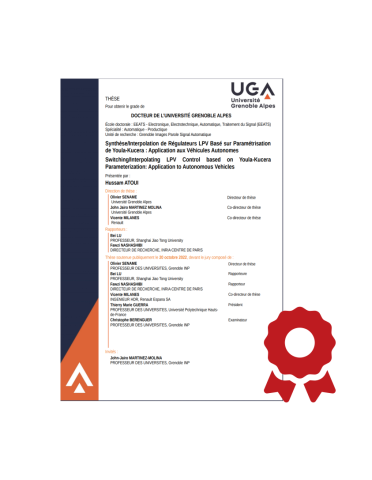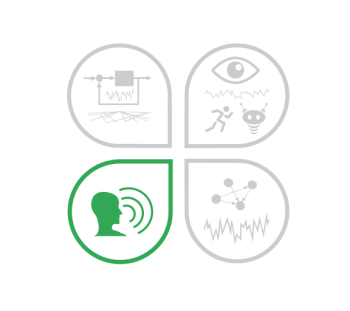Multidisciplinarity in cognitives sciences/language sciences
The heart of the PCMD team's research deals with studying the relationship between oral language and the cognitive processes that ensure its functioning. The cohesion of the team is based on the disciplinary complementarity of its members (affiliated to sections 07 (Information Sciences), 26 (Brain, Cognition and Behavior) and 34 (Language Sciences) of the French National Center of Scientific Research (CNRS); to sections 07 (Language Sciences), 16 (Psychology and Ergonomy), and 61 (Computing and Signal treatment) of the National Council of French Universities (CNU); and to Doctoral Schools EDISCE and LLSH at the Université Grenoble Alpes) around a common theoretical framework in cognitive sciences and language sciences, granting us autonomy for experimentation, data processing and modeling.
Research topics
A characteristic of the team is to study speech as anchored in the reality of the body that produces it, and located in a context of interaction with an interlocutor. All the projects developed in the team share this question: how anatomical/physiological, neurophysiological, linguistic and situational constraints affect or even structure the cognitive processes of production and perception of oral language and spoken communication in the broad sense, not only in adults, but also during development in children, and in children and adults with speech disorders (clinical phonetics).
These questions are addressed by combining experimental methods (behavioral recording including Babylab, motion capture, EMG, TMS, sensory disturbances, brain imaging, EEG, MEG, fMRI) with computational modeling (signal processing, control theory, Bayesian models , AI).
Research topics and projects of the team can be grouped in three 3 axes :
- Sensorimotor Control of Speech
- Cognitive Processes of Speech Encoding/Decoding
- Communication in interaction
You will find below the most recent projects lead by members of the team along these three axes (with the mention of the members implied, their collaborators and the main funding agencies):
Chiffres-clés
12
permanents
11
doctorants & post-doctorants
Axes de recherche
Les thématiques de recherche de PCMD se regroupent en 3 axes principaux :
- le contrôle sensorimoteur de la parole
- les processus d’encodage/décodage et les unités de la parole
- la communication interpersonnelle en interaction
Mots-clés
production de la parole, perception de la parole, contrôle moteur de la parole, rétroaction somatosensorielle, modèles biomécaniques, adaptation de la parole, phonétique clinique, textos sur smartphone, phonétique clinique, prosodie, unités rythmiques, substituts de la parole
Projets
Speechstab
2021-2025
Financement : ANR-21-CE28-0022.
Coordinateur : Takayuki ITO
Inception
2022-2025
Financement : ANR-21-CE37-0017
Coordinateur : Pierre BARADUC, en collaboration avec Nathalie HENRICH (GIPSA-lab, MOVE)
Stut&Learn
2022-2025
Financement : IRGA
Coordinatrice : Maëva GARNIER
Salammbo
2018-2021
Financement : ANR-17-FRAL-0005
Coordinatrices : Marion DOHEN et Amélie ROCHET-CAPELLAN
ComEns
Financement : FIRAH.
Coordinatrices : Amélie ROCHET-CAPELLAN et Marion DOHEN
Com4Child
Financement : MSC ITN 860766
Coordinateurs : Takayuki ITO et Anne VILAIN
HearCog
2017-2021
Financement : ANR-17-CE28-0006
Coordinatrice : Anne VILAIN, en collaboration avec Hélène LOEVENBRUCK (LPNC, Grenoble)
Eulalies
2019-2023
Financement : ANR-19-CE28-0016.
Coordinatrice : Anne VILAIN
GeoTeleLing
Financement : CNRS Projet 80|Prime
Coordinateur : Julien MEYER, en collaboration avec Fanny MEUNIER (BCL-Nice), Rachid RIDOUANE (LPP-Paris) et Damien DAVY (LEEISA-Guyane)
AmazonLing
Financement : IEA-CNRS
Coordinateur : Julien MEYER en collaboration avec Hein VAN DER VOORT, Vilacy GALUCIO, Denny MOORE (Museu Goeldi, Brésil)
ParticipAAction
Financement : Fondation Maladies rares
Coordinatrices : Marion DOHEN et Amélie ROCHET-CAPELLAN.
Phone
Financement :
Coordinateur : Sonia KANDEL.
EcoSpeech
Financement : Parc Amazonien de Guyane, Labex Ceba
Coordinateur : Julien MEYER en collaboration avec Damien DAVY (LEEISA-Guyane), Fréderic SÈBE (ENES-St-Etienne, Office Français Biodiversité-Grenoble)
Faits marquants
Jean-Luc SCHWARTZ est membre de la chaire Bayesian Cognition and Machine Learning for Speech communication de l'Institut MIAI Grenoble Alpes.
Partenaires
Partenaires académiques
- CNRS 34, 26, 07
- UGA ED EDISCE et LLSH
- CNU 07, 16, 61
Partenaires industriels
- Arturia
- ANSYS
- Apwayra





